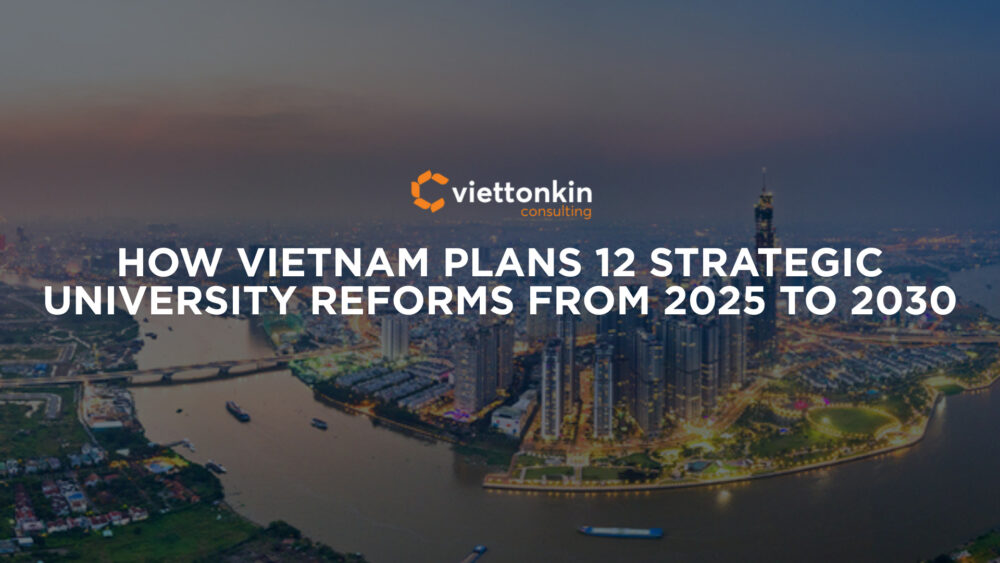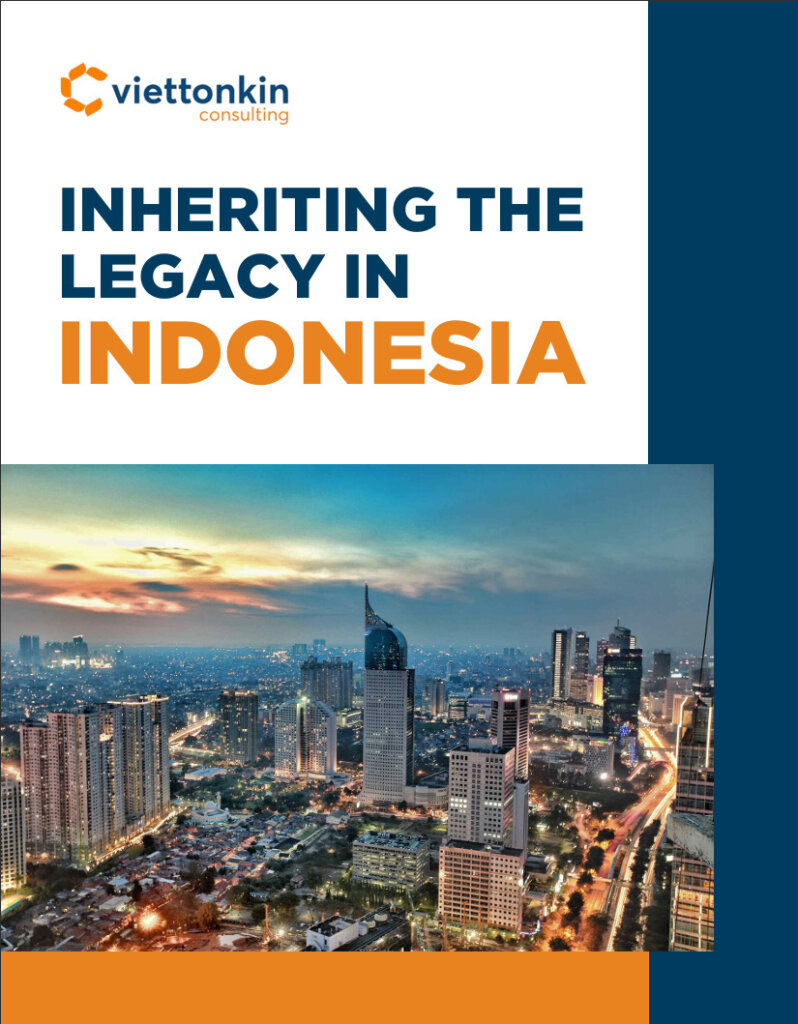In Vietnam, the specifics of offer and acceptance can determine whether you have a legally binding contract at all. The process of contract formation is governed by strict rules, and a simple oversight can mean that the parties never created the legal relations they intended. For any business operating here, understanding when an agreement becomes […]
Vietnam is at a strategic inflection point: transitioning from a global manufacturing hub to an innovation-driven knowledge economy. To fuel this leap, the government is focusing on a foundational element: developing high quality human resources through major reforms in Vietnam's education sector. This strategy is crucial for building a talent pipeline for key sectors.
According to the Report at the 2025 University Conference of the Department of Higher Education, during the term 2025-2030, there are 12 strategic projects in higher education, which is the blueprint for this ambition. This is not merely an education reform; it is a deliberate industrial strategy to create a talent ecosystem capable of attracting high-tech foreign investors. This will secure Vietnam's position in the future global value chain and meet the rising demand for skilled labor.
Key Takeaways:
- Vietnam is rolling out 12 key projects to restructure the education sector, shifting the focus of its higher education institutions from quantity to excellence.
- Core goals by 2030 include placing 10 Vietnamese universities in Asia's Top 100 and transitioning 30% of education programs online.
- Developing higher education facilities in the Southeast, Buon Ma Thuot and Da Lat regions
- High-tech sectors like semiconductors and AI are a central focus, with specialized programs in many education institutions designed to meet foreign investor demands.
- New policies encourage public-private partnerships, creating opportunities for foreign investors to help address challenges in financing and university autonomy in the higher education system.
- This transformation of higher education creates significant opportunities for international partners and EdTech providers to collaborate with local higher education institutions.
The National Vision For Higher Education 2025-2030

Vietnam is entering a decisive decade, aiming to turn its higher education institutions into engines of innovation and economic competitiveness.
This comprehensive reform impacts multiple education institutions and is guided by clear legal frameworks. The vision reflects a strategic shift from expansion to excellence in higher education.
An Integrated National Education System
These higher education reforms are the capstone of a broader vision for the entire national education system. The strategy recognizes that success depends on a strong foundation, starting from early childhood education and preschool education. Quality inputs from primary education, lower secondary education, and upper secondary education are essential.
This pipeline, delivered through a network of general education institutions and general education schools, ensures students are prepared for advanced studies.
Furthermore, the plan strengthens teacher training institutions to supply qualified educators across all levels. This integrated approach connects every stage, from preschool education to the most advanced higher education institutions.
Key Frameworks Steering Reform
According to a report from Vietnam.vn (2025), the foundation for this transformation is built on strategic government decisions and resolutions, such as: Resolution No. 71-NQ/TW dated August 22, 2025, of the Politburo on breakthrough development in education and training; Resolution No. 281/NQ-CP promulgating the Government's Action Program to implement Resolution No. 71-NQ/TW; These legal documents set the political direction for innovation and quality improvement across Vietnam's education sector.
They establish a clear roadmap for modernizing higher education institutions and ensuring they are competitive and aligned with labor market demands.
Core Objectives By 2030
According to VietnamPlus (2025), the nation aims to have digital education accounting for 30% of all higher education by 2030. Higher education institutions will be reorganised to enhance capacity at existing establishments, with those failing to meet standards to cease operations 2030.
The plan also includes expanding education institutions and their branch campuses to regional cities to ensure equity and access.
This demonstrates a strong commitment to building an inclusive higher education system that supports lifelong learning.
Transformative Insight: Shifting From Quantity To Quality
The core of this strategy is the shift from expansion to excellence in the education sector. According to Vietnam Briefing (2025), the upcoming phase will prioritize improving governance and research capacity within higher education institutions.
For foreign investors, this opens golden opportunities in EdTech, scientific research, and university-industry partnerships in Vietnam’s education sector.
Inside The 12 Strategic University Reforms

Vietnam has identified 12 strategic projects to realize its higher education vision. Each project represents a core pillar of this transformation, impacting dozens of education institutions from digitalization to talent cultivation for future industries.
The focus on education and training development is clear in each initiative.
- Developing A Nationwide University Network: Aims to create a balanced distribution of higher education institutions and establish branch campuses to serve regional needs.
- Building A National Open Educađtional Resources Platform: Promotes open-access digital materials and international cooperation with ASEAN OER networks.
- Training High-Tech Human Resources: The plan targets producing 5,000 engineers and 2,000 PhDs with doctoral degrees annually. As Vietnam Briefing (2025) highlights, this is a critical step to meet the demand for highly skilled human resources through enhanced doctoral training.
- Upgrading Regional Universities In The South-East: Strengthens three key higher education institutions near hubs like Ho Chi Minh City. These major universities will serve as regional innovation centers.
- Developing New Universities In Buon Ma Thuot & Da Lat: Focuses on fields like climate resilience and sustainable development.
- Semiconductor And Electronics Workforce Program: Aims to train 50,000 specialists, bridging higher education with vocational education.
- Establishing Advanced AI Training Centers: Five AI institutes will be established to integrate education and leading research.
- High-Speed Rail Human Resource Development Project: Will provide specialized human resource training for 15,000 engineers. This addresses the needs of large-scale technical infrastructure projects.
- Faculty And University Leadership Capacity Enhancement: Provides overseas doctoral programmes at prestigious foreign universities and leadership training. These programs are designed to support lecturers and associate professors, directly improving the quality of university lecturers and education administrators. About 1,500 Doctors who are currently working abroad come to work at higher education institutions.
- Digital Universities Program: Focuses on developing five digital universities that integrate online learning, virtual labs, and shared open courses. The program aims to enable 20,000 students across 50 online undergraduate programs, fostering Vietnam’s transition to fully digital higher education.
- Student Digital Competency Framework: Standardizes digital and AI literacy benchmarks against national standards. This ensures graduates from all education institutions are work-ready.
- Lifelong Learning And Community Education Network: As reported by Vietnam.vn (2025), six educational institutions will serve over 15,000 learners.
Challenges And Opportunities Ahead

This ambitious training development plan will face challenges but also unlocks tremendous opportunities for education institutions and investors. The rising demand from a growing middle class for better higher education fuels this transformation.
Financing And Autonomy
A significant hurdle is securing sufficient resources for infrastructure investment. The government is promoting PPP models and encouraging participation from foreign investors, potentially through tax incentives. According to Vietnam Briefing (2025), this policy shift creates an attractive environment for investing in Vietnam’s education sector, but the challenge will be to allocate sufficient resources effectively.
Quality Assurance And Global Standards
There is increasing pressure for higher education institutions to align with international standards. For administrators at both general education and higher education levels, implementing frameworks like ISO 21001 is crucial for ensuring quality. This alignment is vital for attracting international students.
Digital Transformation Momentum
The push for digitalization in higher education is accelerating inclusion and scalability. This presents a major opportunity for EdTech companies to collaborate with Vietnamese universities, including the Vietnam National Universities in Hanoi and Ho Chi Minh City. The goal is to enhance scientific research activities through better technology.
What Stakeholders Should Do Now
- For Policymakers: Finalize incentives for private investment, streamline accreditation for higher education institutions, and monitor outcomes transparently.
- For University Leaders: Audit readiness for digital transition and prioritize programs aligned with key sectors, ensuring their education institutions lead in innovation.
- For Investors & Global Partners: View these 12 projects as a roadmap for joint ventures, R&D collaboration, and investment in the education sector.
- For Students & Families: Shift focus toward STEM, basic sciences, and vocational training pathways to seize future opportunities in the evolving job market.
In summary, these 12 strategic projects form a detailed roadmap for an ambitious education and training development agenda.
By 2030, Vietnam aims to become an ASEAN model for digital higher education and workforce development. The collaboration between policymakers, investors, and higher education institutions is key to realizing this vision.
Frequently Asked Questions
What is the most critical objective of these 12 higher education reform projects?
The overarching goal is to shift Vietnam's higher education system from a focus on scale to a focus on quality and excellence. This is designed to enhance national competitiveness and produce high-caliber talent for future-focused industries, improving the country's overall vocational training and professional landscape.
How will these projects be financed, given limited public funds?
The government is actively promoting public-private partnerships (PPPs) and encouraging investment from the private sector, including vocational education institutions. Based on our experience, creating clear incentive mechanisms is critical to attracting strategic capital for large-scale projects in the education sector.
What is the biggest challenge in implementing these reforms?
The greatest challenge lies in balancing speed with quality across the general education and higher education systems. Implementing 12 projects while ensuring international standards requires tight coordination and effective governance, especially for vocational education, which needs to align closely with industry needs.
You may also like: An Brief Overview of Vietnam’s Edtech Market












